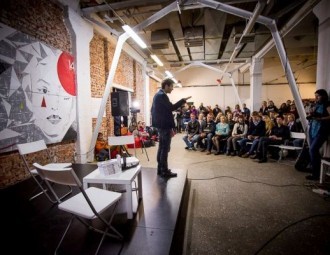Julia Darashkevich: "CECH" looks for an adequate owner, who won’t turn us out after three months

Thanks to the lessee the interior of the neglected factory turned into one of the Minsk galleries; but all of a sudden the owner of the Soviet “industrial” ordered to free the building.
One of the main Minsk areas for exhibitions, discussions, and civil society events – "CECH" Art-space is denied the building. The owner of the store premises at Nezalezhnosti Avenue 58 – BelSwissBank – refused Julia Darashkevich, the creator and curator of “CECH”, photographer to renew the lease contract.
“Today I was in BelSwissBank and paid “CECH” rent. Our “curator” from the real estate department asked us to drop in, saying she wants to congratulate us. She gave me a bag with promotional products and a paper about non-renewal of the lease, signed by the Chairman of Board of the BelSwissBank”, - Julia Darashkevich wrote on her page in Facebook.
What is the reason for refusal? According to Julia, she got an unclear answer from the bank: “It doesn’t depend on us”. The term of the current lease expires on February 13.
“EuroBelarus” Information Service talked with Julia Darashkevich about the reasons that made “CECH” disagreeable to the Bank, whether “CECH” will continue its work, and where.
- Julia, in your opinion, what was the real reason for refusal of the BelSwissBank?

- I would like to know that idea, but I don’t. I wasn’t informed.
- Do you connect it with the reinsurance of the authorities before the president election, when they close areas for social and political discussions?
- I don’t see direct link here, as our problems started almost a year ago, and have been lasting for now. It is rather the bank’s unwillingness to see certain events in “CECH”. It might be someone’s order from above.
Last February after our six-month work, we renewed the lease contract, though without the right for sublease, which questioned the existence of the area, as apart from our own events we also lease it to other organizations, which come with their own events.
In March we received the letter that the Bank is worried that we use the building not on its intended functional purpose. For some time we were trying to switch the buildings to the administrative status, but the Bank refused to provide us the necessary documents.
This talk died away for a while only to wait until the contract is over.

- The term of the contract expires on February 13. Where “CECH” is planning to move? Are there any preliminary plans?
- I don’t know the answer to that question yet, as the Bank granted us with the notification of December 31. And the question is not only about the building, but also more about an adequate owner who won’t turn us out after three months.
- Are there any fears that “CECH” might repeat the fate of “Art-Siadziba”?
- We don’t want to lead the nomadic life that “Art-Siadziba” is leading.
We would like to stay for a long term, as the events that we organize require constant area, and don’t want put up money into some temporary places. So I won’t be surprised if we won’t find such place in Minsk.
If we don’t find an adequate owner, we won’t lead a nomad’s life. But we would be happy to get any help in finding the right place.

- What did “CECH” manage to do during the last 2014 year? What bright events did happen within your area?
- We organized different events typical for clusters.
In 2014 we had second educational six-month course of photojournalism. And within the frames of the course we are now having an exhibition “Closer than close”. Unfortunately, it’ll be the last exhibition in “CECH”. The exhibition presents the works of 11 young Belarusan photographers. We stake on projects like these.
As to the object of our honor, it is the month of photography organized in Minsk by Andrei Liankevich for the 1st time. This autumn best Belarusan photographers, as well as experts from Latvia, Poland, Ukraine, and Russia brought their works in Minsk, held lectures, and presented books.
Within the year we had 15 different events – educational, cultural – in the sphere of photography. And what is most important we were the organizers of the first prize for photographers in the sphere of documental and art-photography. An exhibition “Prafota” (“Aboutphoto”) took place by the results of the prize.
“Feminist criticism” was one more huge exhibition that was organized in “CECH” for a second year in a row. Besides, we have the whole season of “Mova ci kava”, an educational event that attracted numerous beautiful young people to “CECH” each Monday.
Our regular clients were “Budz’ma Belarusami!”, the Flying University, “New Europe”. We had several projects with Goethe Institute, a long-term course of Andrei Liankevich on multimedia, an exhibition of street-art, several Hack for Future events, where active people gather to create socially important projects, several workshops on urbanism. Besides, round tables, discussions, exhibitions, freemarkets…
- Can the “CECH” constant public hope for the opening of what has become a habitual area in a new format?
- I don’t want to promise anything. We have already been thinking about closing, but many people keep telling us that we need to continue our work, we need to look for a new building, we will. But let me repeat, we will move only if the owner is loyal towards our activity. If we don’t find such building we won’t walk around town with no constant place; it is impossible for “CECH”.

-
03.01
-
07.10
-
22.09
-
17.08
-
12.08
-
30.09



























